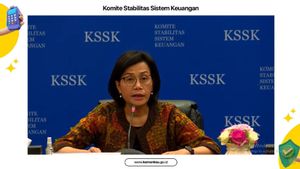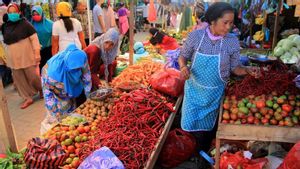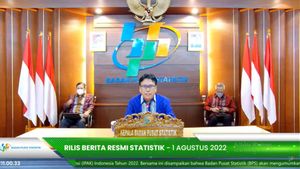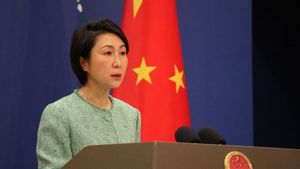JAKARTA - Indonesia is currently facing various external challenges that can affect the national economy.
Starting from the pandemic, the Russo-Ukrainian war, and also the economic slowdown of developed countries, namely the United States and China.
However, the Indonesian economy is still safe because it is supported by strong domestic consumption.
Bank Mandiri economist Faisal Rachman said that Indonesia's economy tends to be less open.
More than 50 percent of the Indonesian economy is supported by domestic consumption. So the impact is not significant.
"In addition, coal demand remains strong, even though China is slowing down. This is because European demand has increased amid a decline in energy imports from Russia," he said in Jakarta, Monday, August 1.
As is known, the US, China, Europe are Indonesia's export destinations. So, if the three countries weaken, demand for Indonesia's exports will fall and commodity prices will also be affected.
Based on BPS data, the value of Indonesia's exports from January to June 2022 reached US$141.07 billion, an increase of 37.11 percent over the same period in 2021.
Meanwhile, non-oil and gas exports reached 133.31 billion US dollars, up 37.33 percent.
Beware of Inflation
Therefore, said Faisal, the thing to watch out for is the domestic inflation rate.
Moreover, BPS reported that the domestic inflation rate last month was 0.64 percent compared to the previous month or month to month (mtm).
Higher than June 2022 which was 0.61 percent. However, on an annual basis or year on year (yoy), the inflation rate accelerated.
Inflation in July 2022 was recorded at 4.94 percent yoy, higher than the previous month's 4.35 percent and the highest since October 2015.
Faisal explained that there are three factors that affect inflation, namely the price of basic commodities, transportation, and household consumption such as electricity and fuel.
"Furthermore, we still predict that inflation will continue to rise substantially and fundamentally in the second half of 2022. This is more due to the increase in demand (demand-pull inflation) following the easing of PPKM which makes people freer to move and the speed of money spins," said the man who is familiarly called Oce.
Although the inflation trend is expected to continue to rise, Ocer said he is optimistic that inflation will be at 4.60 percent by the end of the year, slightly above Bank Indonesia's range of 3 percent plus 1.
Oce's income, Indonesia's economic condition will still be good. Especially when compared to the beginning of the Pandemic.
"I don't think it will be as bad as during the COVID-19 pandemic. Because even though it is weak, demand will still improve,” said Oce.
Meanwhile, Next Policy Executive Director Fithra Faisal Hastiadi revealed that Indonesia's commodity stocks are indeed in a safe condition.
SEE ALSO:
Indonesia's agricultural sector has performed quite well with an abundance of supply. On the other hand, the production inputs of many developed countries have decreased.
"Because during the recovery of COVID-19 from the input side of production, big countries, not only Japan, experienced shortages. Meanwhile in Indonesia, we have over supply,” he said.
In fact, they need a supply of commodities for economic recovery affected by the pandemic. This then gave rise to discourse for exports from Indonesia to other countries.
“So our agricultural sector is oversupply, then our fertilizer is also oversupply. There is even a desire to export to Africa and also to Latin America,” he added.
Therefore, the economist from the University of Indonesia advised the government not to be complacent with the abundant domestic supply.
According to him, the government must be aware of the demand for domestic commodities which also shows an increase.
"It's just that in terms of exports, we also have to be careful. Don't let this be too aggressive. Later when we need it is rare. We are currently growing in terms of demand, so that we don't let optimal demand supply scarce inputs," he said.
Furthermore, Faisal said, the simulation results show the possibility of losses if Indonesia is too aggressive in exporting.
"The simulation results show that if we export commodities too aggressively, in the second quarter of 2023, they start to become scarce and ultimately have a negative effect on the economy," he said.
The English, Chinese, Japanese, Arabic, and French versions are automatically generated by the AI. So there may still be inaccuracies in translating, please always see Indonesian as our main language. (system supported by DigitalSiber.id)

















